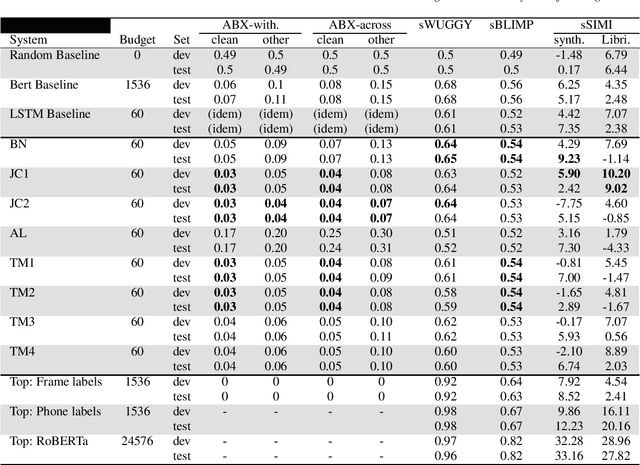Patricia Rozé
The Interspeech Zero Resource Speech Challenge 2021: Spoken language modelling
Apr 29, 2021

Abstract:We present the Zero Resource Speech Challenge 2021, which asks participants to learn a language model directly from audio, without any text or labels. The challenge is based on the Libri-light dataset, which provides up to 60k hours of audio from English audio books without any associated text. We provide a pipeline baseline system consisting on an encoder based on contrastive predictive coding (CPC), a quantizer ($k$-means) and a standard language model (BERT or LSTM). The metrics evaluate the learned representations at the acoustic (ABX discrimination), lexical (spot-the-word), syntactic (acceptability judgment) and semantic levels (similarity judgment). We present an overview of the eight submitted systems from four groups and discuss the main results.
The Zero Resource Speech Benchmark 2021: Metrics and baselines for unsupervised spoken language modeling
Dec 01, 2020



Abstract:We introduce a new unsupervised task, spoken language modeling: the learning of linguistic representations from raw audio signals without any labels, along with the Zero Resource Speech Benchmark 2021: a suite of 4 black-box, zero-shot metrics probing for the quality of the learned models at 4 linguistic levels: phonetics, lexicon, syntax and semantics. We present the results and analyses of a composite baseline made of the concatenation of three unsupervised systems: self-supervised contrastive representation learning (CPC), clustering (k-means) and language modeling (LSTM or BERT). The language models learn on the basis of the pseudo-text derived from clustering the learned representations. This simple pipeline shows better than chance performance on all four metrics, demonstrating the feasibility of spoken language modeling from raw speech. It also yields worse performance compared to text-based 'topline' systems trained on the same data, delineating the space to be explored by more sophisticated end-to-end models.
 Add to Chrome
Add to Chrome Add to Firefox
Add to Firefox Add to Edge
Add to Edge